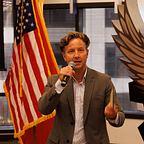Another Healthcare Desert Identified Further Revealing Gaps in Broken System
Unveiling Access Gaps: A Glimpse into Healthcare Equity Challenges
The narrative of healthcare deserts isn’t new, yet with each revelation, it stirs a fresh wave of awareness, urging us to look critically at the deepening gaps in a system we all rely on. The recent emergence of Pharmacy and Recovery Deserts (read the paper) validate the divide. These deserts throughout America, stark in their absence of essential health services, must not be ignored.
Pharmacy Deserts reported Sunday by the Washington Post, unveil the picture of communities scrambling for basic medications and healthcare advice, as their local drugstores shutter down. Recovery Deserts, a project that I collaborated on with colleagues from The Ohio State University and the community, sketch the grim reality of individuals entangled in the shackles of addiction with no escape. The common underpinning? An unfair health system failing to bridge the chasm between need and access.
The beauty of community lies in its power to unite in adversity. The reality of these healthcare deserts ought to stir more than just empathy; it should propel us towards a collective action aimed at identifying and eradicating these deserts one at a time.
Now is the time for the government, healthcare institutions, big pharma, academics, scientists, technologists, designers, and we, the community’s changemakers, to rally together and tackle the root causes head-on. It’s about listening to the stories, fostering a mindset of change, direct advocacy, and immediate action across jurisdictions.
The problem isn’t too big to solve. However, from my vantage point, the resolution rests in local initiatives powered with resources and advanced tools; supported by local, state, national, and international stakeholders. It’s a tall order, especially when technology is lacking across government institutions, and politics and motivations are both scattered and massive barriers. Yet, it’s a step we must take to mend the broken system that leaves far too many stranded in deserts of despair.
In 2017, I outlined a tool for the Governor of Ohio to tackle healthcare access issues related to opioid treatment. With today’s Web3 and AI advancements, this idea is closer to reality. Science has validated the initial algorithm, paving the way for actionable solutions. Web3’s blockchain technology enables permission-based access and secure data sharing across jurisdictions, and AI facilitates large-scale analysis and forecasting, aiming to address healthcare deserts with essential resources through unified efforts.
We hear your stories. We see the patterns. And I believe now more than ever, we have the community, talent and resources to tackle this issue head on. We await the invitation to get started making a genuine change.
David All is a changemaker, visionary leader and social entrepreneur. In 2016, his team established an intensive outpatient treatment center to meet the needs of an underserved community. While volunteering for the Franklin County Opiate Crisis Task Force, he created resources and orchestrated community dialogues and high-impact discussions. He led the Recovery Deserts Project, co-authoring a 2021 research paper with a team from The Ohio State University.
